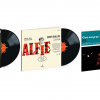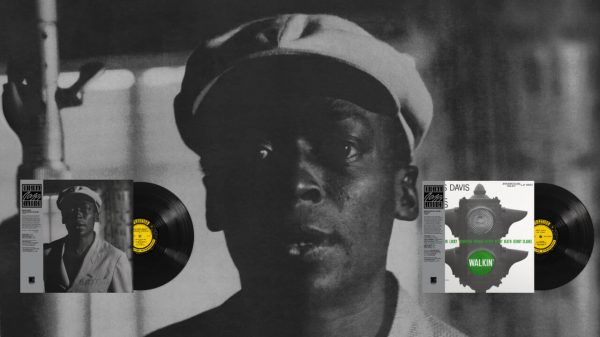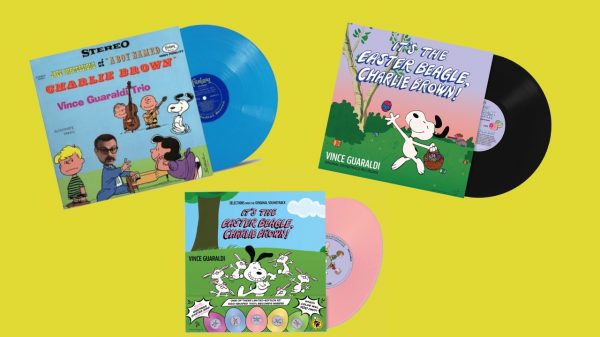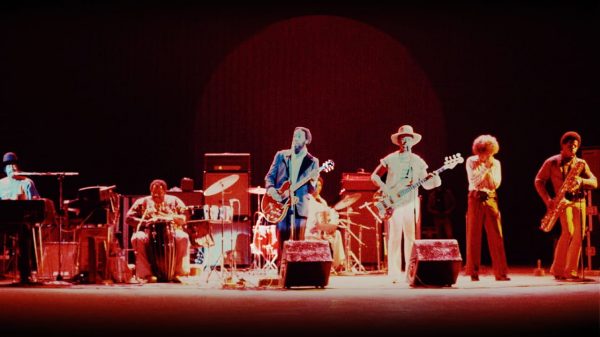There’s a widespread view that only tech industries need to innovate. Yet nothing could be further from the truth.
Even arts and entertainment businesses require constant infusions of fresh talent and new ways of thinking. It’s their lifeblood and oxygen. And if they can’t (or won’t) find it, stagnation sets in. At that juncture, even major artistic endeavors start to feel anachronistic and backward-looking.
Could this really be happening now, and in our culture?
It seems impossible—after all, billions of dollars are spent every year by entertainment corporations in their quest for market dominance. Yet, despite this constant spending spree, almost every week brings a new sign of cultural stagnation.
The latest news comes today from market research outfit Luminate, who tell us that the share of new music continues to shrink in the face of competition from old songs. I wrote about this a few months ago, and the numbers were already ugly back then.
But they have gotten worse.
The latest report shows that the consumption of old music grew another 14% during the first half of 2022, while demand for new music declined an additional 1.4%. These old tunes now represent a staggering 72% of the market.
The overall consumption of Current music is down 1.4% over this point last year. Luminate 2022 Mid-Year Music Report

And it’s likely to get worse when the full year numbers are released—because we are still in the midst of the Kate Bush/Metallica phenomenon spurred by the showcasing of their old songs on Stranger Things.
If this were just a short term blip of nostalgia caused by a popular TV show, I might ignore these numbers. But every other bit of market research tells the same story.
A number of recent articles on Hollywood have announced that we are living in the Golden Age of the Aging Actor. Harrison Ford, who turns 80 this week, may be the most prominent example. As the public face of several major brand franchises, he is still in demand, and will soon show up in another Indiana Jones movie, a kind of Raiders of the Lost AARP Card affair. But this aging Ford assembly line is hardly an isolated example—the graying actor is everywhere. Top Gun is the biggest box office success of the year, and it features Tom Cruise reprising a role he last played in 1986. I fully expect to see a septuagenarian Superman or Batman in the future.

The Ringer recently tried to quantify this trend. They show that a sharp upward turn in the average age of leading stars began around the year 2000—and never ended. And it’s true not just for the lead star, but also others on the cast.
Even the word ‘old’ is now used to market a movie. Not long ago, that was a rarity—used for comic effect—but today it’s a mark of pride.

If you think things are bad now, just wait. The next wave of cinema tech will allow studios to make films with dead actors. That will get interesting—especially when the corpses are called to the podium to accept their Academy Awards. Well, at least nobody will get slapped onstage.
I’d like to be amused by all this, or maybe even applaud these senior citizens who have somehow extended their careers beyond normal limits. But the larger picture is disturbing.
Just follow the dollars. Every big budget movie this year is either a reboot, sequel, prequel, remake, or brand extension. Every last one of them. The largest investments in music are the acquisition of old publishing catalogs, while almost nothing is spent developing new artists. Even TV is turning into a brand extension game—Netflix just announced that it will sell board games based on Stranger Things and Ozark. Netflix doesn’t have as many brands to milk as Disney, the unassailable champion of mummified old concepts, but they are determined to squeeze the ones they’ve got as hard as possible.
Nobody wants to take a chance on something new and different. It’s just too risky. You could even get fired for that.
But when cultures stop innovating, they soon lose the essential skills they need for their survival. I’m reminded of the Arch of Constantine built by order of the Roman Senate between the years 312 and 315 AD—when the Empire, for all its military might, had forgotten how to create impressive artistic works.

As a result, the builders of this monument had to steal parts from older structures. You could call it the first reboot, and it looks a lot like the entertainment business today. They took works designed to honor earlier emperors—Marcus Aurelius, Hadrian, Trajan—and pretended they were relevant to the current situation. The result was what we call anachronism—when something from a different time period is placed incoherently in the midst of newer material.
It’s like walking down the street in a suit of armor, or riding a horse to the supermarket. It might seem amusing at first, but when you start seeing things like this everyday, you begin to get worried.
We have now apparently arrived at the Era of Anachronism in our own creative culture. An 80-year-old man is the star of an action movie. A tune from a different century is the song of the summer. Superheroes from the distant days before World War II are constantly juxtaposed with current urban blight, as if it were the most natural thing in the world. And maybe all this is even entertaining for a while—until you start asking how this story ends.

But we already know the answer to that. There have been other periods of artistic stagnation in the past, and they usually signaled a collapse in other spheres of society too. You can’t lose creativity in the arts—its natural home—without seeing a rise of close-mindedness in other fields as well.
But I don’t expect this trend to reverse anytime soon. Even scarier, at a certain juncture, we lose the key skills we need to support and nurture fresh perspectives and new creative endeavors.
The financial support for them has already dried up. And what happens when the creative economy only invests in the past, not the future. I’m afraid we are going to find out.
Ted Gioia is a leading music writer, and author of eleven books including The History of Jazz and Music: A Subversive History. This article originally appeared on his Substack column and newsletter The Honest Broker.
Related reading:














































ORT
July 22, 2022 at 12:52 pm
Do you really wish to know why this is happening? I suspect you already do but as you have asked a question I thought I would respond in kind.
ORT
James
July 22, 2022 at 9:05 pm
Decades of intellectual property theft created 2.5 generations of people who won’t pay for content. Only old people will pay in sustaining numbers, quite like art was supported for nearly 1,000 years. What’s old is new again. Somehow art survived.
Aggy
November 15, 2022 at 12:48 pm
“Decades of intellectual property theft created 2.5 generations of people who won’t pay for content.”
Agree. New music dead because there’s no money in it any more. Successful artists in the 1980s used to make insane amounts of money. Now they make peanuts. Big money attracts talent. And to add insult to injury, soon AI will be making good music for free.
Stephen
July 22, 2022 at 10:15 pm
I don’t really think this is a big mystery. The population is aging. It has been for quite a while. These older folks grew up with all of these film and TV stars and musicians so there’s a predisposition to still go back to them. There certainly doesn’t seem to be a lack of new music. Every week I browse all of the new releases on TIDAL and there’s tons of them. Most of them I’ve never heard of because I can’t keep up with all of the new artists. I’m one of those people that tends to listen to older stuff. And maybe the older stuff is better. Obviously that comes across as an old fogey comment but I can honestly say that even though there is new music that I enjoy, I still get by far the biggest thrill from music that I grew up with. I’m sure I’m not alone in that thinking.
Jeff Lynch
July 23, 2022 at 2:39 am
A&R is dead. The focus is on old music, because that is the easiest, highest margin thing for record companies to sell. Developing new artists is hard and expensive. Selling music by dead people is far easier. And their touring requirements are much less demanding.
Audiophile Garage
August 4, 2022 at 11:30 am
Young people are discovering and consuming new music through Twitch, Discord, and YT. I wonder if that consumption is being properly captured.
Ian White
August 4, 2022 at 2:30 pm
TikTok is launching its own music streaming app so it’s clear that young people are not using traditional sources.
My kids use YT, TikTok, and Spotify in that order to find new music.
Best,
Ian White
ORT
November 14, 2022 at 12:43 pm
Familiarity breeds comfort, not contempt. I have little but contempt for those without talent (cRappers, et al) who some how feel (lord knows they do not think) I am going to fund their “crib”.
Neither do I think a 20 Hz “THUD” in any way musical, nor do I want to be told my epidermal pigmentation is a “crime”, think of women as “phat”, “flash a gurl my grill”, despise Law Enforcement, speak “WeeBeez”, “sing” Beatbox and a host of other gems from these turdles.
This new poo is worser than Beatnik “poetry”.
FTN. As another reader said, A&R is no longer living.
One more truth? If I wanted to listen to someone that had zero musical talent I would sing to my self. Cue up Sammy and Carmen’s “Boy Meets Girl”, puhleeeeeze…
ORT
Tony Dyson
November 14, 2022 at 3:30 pm
Bandcamp! Where most of the best new music can be found and auditioned. The big music producers/sellers will want to plug what they already own, so ignore them.
Ian White
November 14, 2022 at 3:51 pm
Tony,
100% agree. Bandcamp is fantastic.
Ian White
Larry Rasczak
November 17, 2022 at 4:55 am
the whole creative culture is losing its ability to innovate. But why?
Probably because anyone who creates something has to be aware of an unwritten, illogical, and constantly changing set of rules that, if violated (even unknowingly) will get them “cancelled”, subject to mobs (cyber and otherwise) and render them permanently unemployable. Even worse, a statement that is perfectly politically correct today may get you cancelled under any new set of arbitrary rules that may be instituted without notice at any time.
I’m guessing that might have something to do with it.
Roger Scott Craig
February 2, 2023 at 12:42 pm
Twelve years ago with the support from many people in the Beatles camp I tried to build a new Platform for artists, MTunz with the fans paying the artists directly and with new ways of connecting the fans to the artists. I had seventy bands offering to help but then the fans all want FREE MUSIC and free music pays musicians and songwriters NOTHING. What do the public expect for NOTHING? Sgt. Pepper or Dark side of the moon? The fans all started stealing music and we are now seeing the results of decades of theft with NO PAY POLICY fans wanting great new music but NOBODY is willing to pay for this music. How about adding an orchestra to your songs? $35,000! Who will pay for that? How about a Horn section or choir? Nobody wants to pay for that either! Well, they tried FREE on the Internet and FREE Is not a business most musicians will stay in. OFF TO GET A DAY JOB today. You know, a JOB that helps me pay my bills!